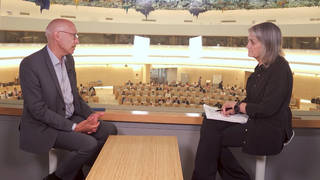
“I am an American ESL teacher. I have been working in Russia for the past two years as a university English instructor. I often used your transcribed interviews and reportage to illustrate and/or introduce many of the usually-unreported topics of the American (and Russian) news media to my students. Many of my students were very interested in the various subjects which your program covers. I constantly recommended the use of your site and anything it links to as high-quality info resources. The fact that your program is transcribed makes it wonderfully useful — students can listen for meaning, and they often can learn a lot from context alone. The transcripts can be reviewed for vocabulary enrichment, for examining spoken grammar patterns, and many other areas relevant to the learning of English. In my ESL lessons, I like to give my students discussion subjects which are more meaningful than the milk-toasty, business-worshipful schlock which all (and I mean ALL) ESL textbooks provide. At the Saratov State Socio-Economic University, for example, I used several DN! interviews and news items — notably an interview with John Perkins (author of Confessions of An Economic Hit Man), your early breaking of the subprime mortgage crisis, vulture funds, Blackwater, the Hugo Chavez UN speech, and materials relating to the privatization of the state (esp re: the war in Iraq) — to illustrate not only the material covered by the reporting or interviews, but the positive power of truly independent news media. DN! materials were only a part of my overall ESL lineup, but they were especially useful, as I mentioned, because I could download the audio files for initial listening-comp use, then show them the print version, which provided a very nicely-dovetailed exercise which also gave them real-life vocabulary and language patterns directly related to economics. It was also very nice to be able to show them that there are direct political and social impacts for every economic decision or action, which are usually buried or glossed over (if not omitted entirely) in the mainstream media.”
-Eric Veley, University level ESL teacher in Russia











